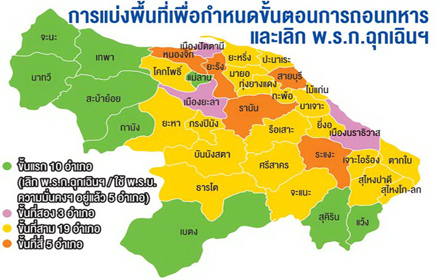Government mulls lifting of state of emergency
The government is considering replacing state of emergency in five districts in the deep South with the Internal Security Act.

Lt-Gen Paradorn Patthanathabut, secretary-general of National Security Council, said that the government wanted to ease restrictions by lifting the state of emergency and replacing it with the ISA in order to encourage Islamist insurgents and their sympathizers to turn themselves in. To do so, the state of emergency must first be lifted but on a case by case basis, he added.
A total of 37 districts in four southernmost provinces with the exception of five districts namely Mae Larn district of Pattani and Songkhla’s Jana, Thepa, Sabayoi and Na Thawee have been placed under state of emergency. The five aforementioned districts are under the ISA.
The anticipated lifting of state of emergency in Yala’s Kabang and Betong districts, Pattani’s Mai Kaen district and Narathiwat’s Waeng and Sukhirin districts will coincide with the withdrawal of "outsider" troops from the region starting in May. The departing troops will be replaced by some 1,690 non-military special action force recruited from former conscripts.
The ISA is considered as "softer" than the state of emergency which is considered as more restrictive. The emergency decree empowers authorities to tap telephones, ban distribution of publications and public assemblies, censor letters and publications and to detain suspects seven days at a time but not more than 30 days in total.
The gist of ISA is in Article 21 exempts insurgents or those wanted for security-related offences who surrender to the authorities from legal prosecution but have to undergo "re-education" for six months.
But the effectiveness of Article 21 of the ISA to encourage defection from the insurgents and their sympathizers is being questioned. Since Article 21 was first enforced, four suspected insurgents turned themselves in in 2010 to under re-education. But eventually, they all reversed their statement claiming that they did not volunteer to enter the reeducational programme.
Two years afterward, two suspected insurgents, Royali Bueraheng and Yaza Jehma, gave themselves up and agreed to undergo the programme. They went through the programme and their criminal case was withdrawn from the court in October 2012..
Lately, the Justice Ministry which is responsible for the reeducational programme was instructed by the NSC to adjust the programme in order to make it more attractive for the insurgents and their sympathizers to turn themselves in.
The planned replacement of state of emergency with the ISA has the blessing of Deputy Prime Minister Chalerm Yubamrung in his capacity as head of the Centre for the Implementation of Policies and Strategies for Solving Problems in Southern Border Provinces.
Mr Chalerm said many people who are facing security-related charges are too afraid of the officials and the law that they are not willing to surrender. The use of Article 21 of the ISA will shorten the legal process and ease the restrictions.
Meanwhile Mrs Angkhana Nilapaichit, wife of missing Muslim lawyer Somchai and head of a committee dedicated to peace and justice, blamed the Tak Bai incident for being the main cause of the conflict and rebellion against the state. She called for the revival of the court case saying that unless the case is put on trial and the wrongdoers held accountable, the conflict will never be resolved.
---------------------------------------------------------------------------------------------------------------------
Caption : Map from Krungthepturakij newspaper
